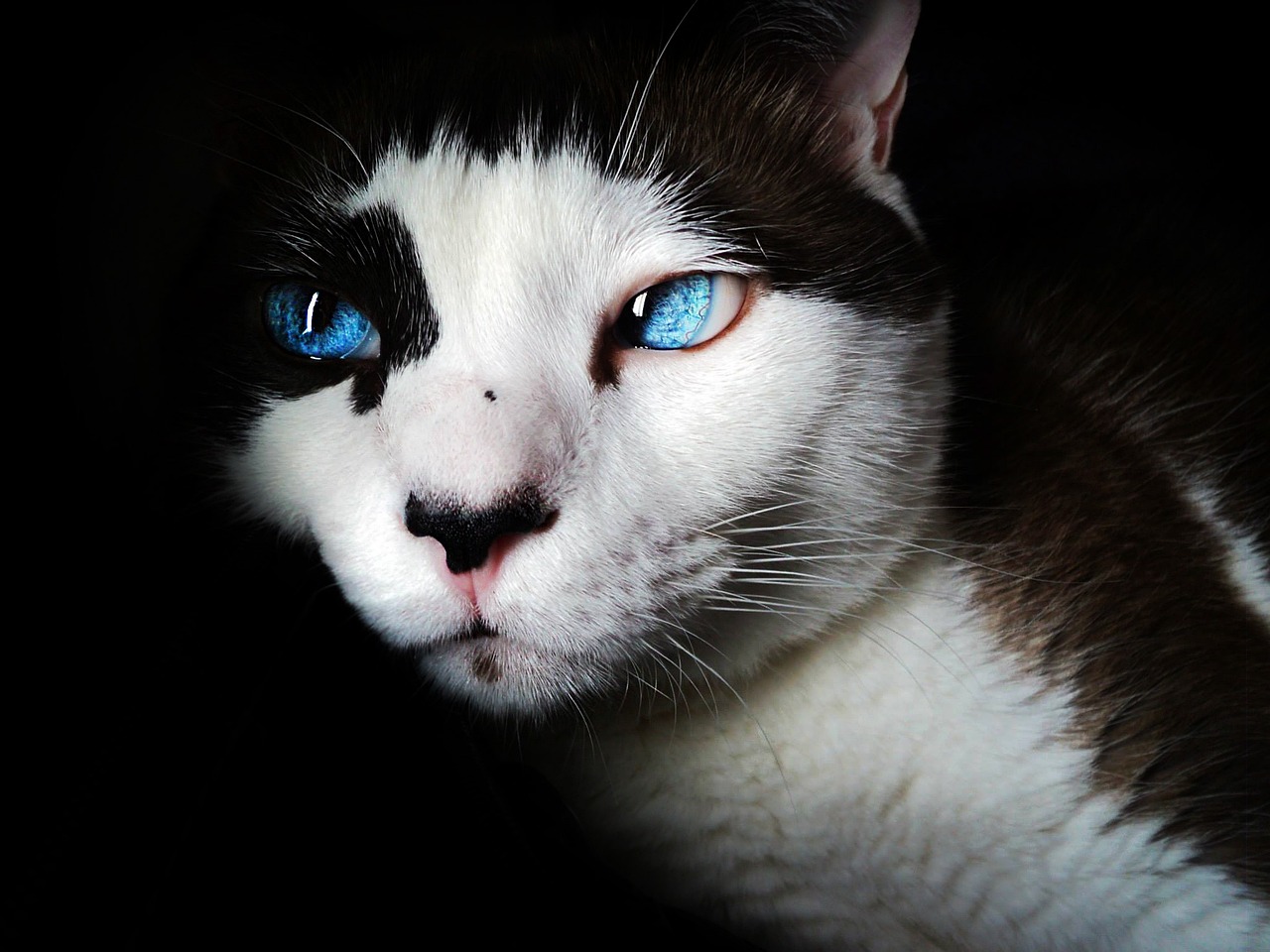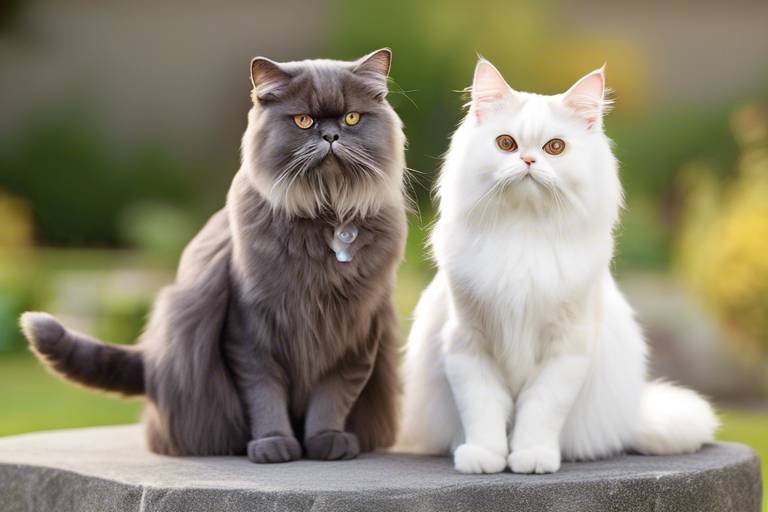The Unique Features of the Balinese Cat
The Balinese cat is not just another breed; it's a fascinating blend of beauty, personality, and intelligence that captivates the hearts of cat lovers around the world. With their stunning looks and playful demeanor, these cats are often likened to a work of art, gracefully moving through their environment with an elegance that turns heads. Imagine a feline that embodies both grace and charm, with a silky coat that glistens in the sunlight and mesmerizing blue eyes that seem to communicate a world of emotions. These unique features make the Balinese cat a standout choice for anyone looking to welcome a new furry friend into their home.
One of the most notable aspects of the Balinese breed is its striking appearance. They boast a long, slender body that exudes an air of sophistication. Their coat, while long, is surprisingly low-maintenance, allowing owners to enjoy their beauty without the hassle of constant grooming. The combination of their physical traits and vibrant personality creates a breed that is not only visually appealing but also incredibly engaging. Balinese cats are often described as the "long-haired Siamese," and while they share some similarities, they possess distinct characteristics that set them apart.
When it comes to their personality, Balinese cats are a delightful surprise. They are renowned for their affectionate nature, often forming deep bonds with their human companions. Unlike some breeds that may prefer solitude, Balinese cats thrive on interaction and are known for their playful antics. They are vocal cats that enjoy "chatting" with their owners, making them feel like a true part of the family. Imagine coming home after a long day and being greeted by your furry friend, eager to share their day with you through a series of melodious meows.
In addition to their social nature, Balinese cats are also incredibly intelligent. They require mental stimulation to keep their minds sharp and their spirits high. Engaging them with interactive toys or teaching them tricks can be a rewarding experience for both the cat and the owner. Their playful demeanor means they will keep you entertained for hours, often engaging in games that showcase their agility and cleverness. Balinese cats are not just pets; they are companions that bring joy and laughter into your life.
In summary, the Balinese cat is a breed that combines stunning physical characteristics with a vibrant personality. Their affectionate nature, intelligence, and playful spirit make them a beloved choice for families and individuals alike. If you're considering adding a Balinese cat to your household, be prepared for a loyal friend that will fill your life with love, laughter, and unforgettable moments.
- What is the average lifespan of a Balinese cat?
The average lifespan of a Balinese cat is around 12 to 20 years, depending on their health and care. - Are Balinese cats hypoallergenic?
While no cat is completely hypoallergenic, Balinese cats are known to produce fewer allergens compared to other breeds. - How much exercise do Balinese cats need?
Balinese cats are active and playful, requiring regular playtime and mental stimulation to stay healthy and happy. - Do Balinese cats get along with children?
Yes, Balinese cats are typically very friendly and can be great companions for children, provided they are socialized early.

Physical Characteristics
The Balinese cat is a breed that captivates with its striking physical traits. One of the most notable features is its long, elegant body, which gives it a graceful appearance reminiscent of a dancer gliding across a stage. This breed typically weighs between 5 to 10 pounds, making them a medium-sized cat that is both agile and sturdy. Their silky coat is another standout trait; it's not only beautiful but also feels luxurious to the touch. The coat comes in various colors, but the most common are the colorpoint patterns, which feature darker hues on the ears, face, paws, and tail, contrasting with their lighter body color.
One cannot discuss the Balinese cat without mentioning its vivid blue eyes. These striking eyes are often described as mesmerizing, drawing you in with their depth and expression. The combination of their coat and eye color creates a stunning visual appeal that is hard to resist. Furthermore, their medium-length fur is less prone to matting compared to other long-haired breeds, making them easier to groom. This is a significant advantage for cat owners who may be intimidated by the grooming needs of other long-haired cats.
Another interesting aspect of the Balinese cat is its distinctive head shape. They have a wedge-shaped head with a slight rounding at the top, complemented by large, pointed ears that give them an alert appearance. Their facial structure is elegant, with a straight profile and a well-defined chin, adding to their overall charm. The combination of these features creates a cat that is not only beautiful but also exudes a sense of intelligence and curiosity.
In summary, the physical characteristics of the Balinese cat make it a truly remarkable breed. Their elegant body, silky coat, and striking blue eyes contribute to their allure, making them a favorite among cat enthusiasts. Whether you are drawn to their beauty or their playful personality, the Balinese cat is sure to leave a lasting impression.

Temperament and Personality
The Balinese cat is not just a pretty face; they come with a personality that captivates anyone who crosses their path. These felines are often described as affectionate, social, and incredibly playful. If you’re looking for a companion that will not only curl up on your lap but also engage in lively conversations, then the Balinese might just be your perfect match. Their vocal nature can be quite charming, and you might find yourself having full-blown chats with your furry friend!
One of the most remarkable traits of Balinese cats is their need for human interaction. They thrive on companionship and are happiest when they’re part of family activities. Imagine a cat that follows you from room to room, eager to participate in whatever you’re doing—whether it's cooking, working, or just lounging around. This engaging nature makes them ideal pets for families or individuals who can dedicate time to them.
Balinese cats are highly social creatures. They don’t just want to be around their humans; they need it. It's almost as if they have an innate understanding that life is better when shared. Their friendly demeanor means they often get along well with other pets, including dogs. Early socialization is key, as it helps them adapt to various environments and companions. If you have other pets, introducing them to a Balinese can lead to a harmonious household filled with playful interactions.
When it comes to forming bonds, Balinese cats take the cake. They are known for their loyalty and affection, often following their owners around the house like a shadow. This behavior is not just endearing; it reflects their deep-seated desire to be part of your life. If you value close relationships with your pets, a Balinese will not disappoint. Their ability to connect emotionally with their humans is one of the many reasons they are loved by cat enthusiasts.
Another fantastic quality of the Balinese cat is their adaptability. They typically get along well with other pets, making them a great addition to multi-pet households. Their friendly nature means they are often the peacekeepers in the house, ensuring everyone gets along. Early socialization can help them adjust to various environments, making them less likely to feel threatened by new companions. It’s like having a furry diplomat in your home!
Intelligence is another hallmark of the Balinese breed. These cats are not just cute; they are also smart cookies! They require mental stimulation to keep their minds sharp and their spirits high. Engaging them with toys, puzzles, and interactive play sessions is essential. Think of it as giving them a workout for their brain! A bored Balinese can become mischievous, so incorporating play into your daily routine is vital to their happiness and well-being.
Here are some common queries about Balinese cats that potential owners often have:
- Are Balinese cats hypoallergenic? While no cat is completely hypoallergenic, Balinese cats are known to produce lower levels of allergens compared to other breeds.
- How much exercise do Balinese cats need? They require regular playtime and mental stimulation to stay healthy and happy. Aim for at least 20-30 minutes of interactive play each day.
- Do Balinese cats get along with children? Yes, their friendly and playful nature makes them great companions for kids.
- How vocal are Balinese cats? They are quite vocal and enjoy "talking" to their owners, often expressing their needs and desires through a range of sounds.
Social Behavior
The Balinese cat is not just a pet; it's a true member of the family. These charming felines thrive on social interaction, making them an ideal choice for families or individuals who can offer them the attention they crave. Imagine a little shadow that follows you around the house, always eager to be involved in whatever you're doing. That's the Balinese for you! Their social nature means they enjoy being part of the action, whether it's lounging on the couch during movie night or joining in on family gatherings.
One of the most delightful aspects of Balinese cats is their playful demeanor. They are not just content to sit back and watch life unfold; they want to be in the thick of it. This breed tends to be very vocal, often engaging in conversations with their humans. It's as if they have a lot to say and want to share their thoughts with you. This vocalization can range from soft chirps to loud meows, depending on their mood and what they want to express. Their communication skills are impressive, making them more engaging companions.
When it comes to bonding, Balinese cats are experts. They form deep connections with their owners, often seeking out affection and companionship. This strong bond can manifest in various ways, such as following you from room to room or curling up in your lap while you read a book. It's not uncommon for them to sit beside you while you work or even nudge your hand for attention when they feel it's time for some love. Their loyalty is unwavering, and they thrive on the affection they receive.
Furthermore, Balinese cats are generally friendly with other pets. Their sociable nature extends beyond just humans; they often get along well with dogs and other cats. Early socialization is key to ensuring they adapt well to different environments and companions. If you introduce a Balinese cat to a new pet slowly and carefully, you might find them forming unexpected friendships. Just picture a Balinese cat and a dog playing together in the yard, showcasing their playful spirits and friendly dispositions.
In summary, the social behavior of Balinese cats is one of the many reasons they are cherished by cat lovers worldwide. Their need for companionship, playful nature, and ability to form strong bonds make them not just pets, but beloved family members. If you're considering adding a Balinese cat to your home, be prepared for a lively and affectionate companion who will bring joy and warmth to your life.
- Do Balinese cats require a lot of attention? Yes, they thrive on social interaction and need plenty of attention from their owners.
- Are Balinese cats good with children? Absolutely! Their playful and affectionate nature makes them great companions for kids.
- How much exercise do Balinese cats need? They enjoy playtime and should have daily interactive play sessions to keep them happy and healthy.
- Can Balinese cats live with other pets? Yes, they generally get along well with other animals, especially if properly socialized from a young age.
Bonding with Humans
When it comes to forming connections, Balinese cats are like the social butterflies of the feline world. These charming creatures are not just pets; they are companions who thrive on interaction and affection. If you’ve ever experienced the warm nuzzle of a cat, you know it’s a special feeling. Balinese cats take this to a whole new level. They have an innate ability to sense your emotions and often respond in kind, making them incredibly intuitive companions.
Imagine coming home after a long day; your Balinese cat greets you at the door, tail held high, as if to say, “I missed you!” This breed is known for its loyalty and affection, often following their owners from room to room, eager to be part of whatever you’re doing. They’re not just looking for a cozy spot on your lap; they want to be involved in your life. This creates a bond that is both deep and fulfilling, making them perfect for families or individuals who cherish close relationships with their pets.
One of the most delightful aspects of bonding with a Balinese cat is their playful nature. They love to engage in interactive play, whether it’s chasing a feather toy or playing hide and seek. This not only strengthens your bond but also stimulates their minds and keeps them active. Regular playtime can be a wonderful way to foster that connection, turning every interaction into a joyful experience.
Moreover, Balinese cats are known for their vocalizations, often chattering away as if they’re trying to engage you in conversation. This communication is another layer of bonding; they want to share their thoughts and feelings with you. It’s as if they’re saying, “Hey, I’m here, and I want to be part of your world!”
In addition to their playful antics and affectionate nature, Balinese cats are also incredibly adaptable. They easily adjust to various environments and lifestyles, making them suitable for families with children, singles, or even seniors. This adaptability further enhances their bonding potential, as they can fit seamlessly into your life, becoming an integral part of your daily routine.
So, if you’re thinking about welcoming a Balinese cat into your home, be prepared for a relationship filled with love, laughter, and loyalty. These cats are not just pets; they are family members who will bring joy and companionship to your life.
- Do Balinese cats require a lot of attention? Yes, they thrive on human interaction and enjoy being part of family activities.
- Are Balinese cats good with children? Absolutely! Their playful and affectionate nature makes them great companions for kids.
- How can I strengthen my bond with my Balinese cat? Regular playtime, gentle grooming, and spending quality time together can enhance your relationship.
- Do Balinese cats get along with other pets? Yes, they are generally friendly and can adapt well to living with other animals.
Interaction with Other Pets
The Balinese cat is often celebrated for its friendly demeanor, making it an ideal companion not only for humans but also for other pets. These cats possess a natural curiosity and sociability that allows them to adapt well in multi-pet households. Imagine a lively household where your Balinese cat interacts seamlessly with dogs, other cats, or even small animals. It's a delightful scene, isn't it?
One of the key aspects of a Balinese cat's personality is its playful nature. When introduced to other pets at a young age, they tend to develop strong bonds and friendships. For instance, if you have a dog, a Balinese cat may engage in playful antics, chasing each other around the house or sharing a cozy spot on the couch. This playful interaction can lead to a harmonious environment, where both pets enrich each other’s lives.
However, the success of these interactions often hinges on proper socialization. Early exposure to various pets can help a Balinese cat learn how to interact appropriately. If you’re considering adding a Balinese cat to your home, it’s crucial to introduce them gradually to existing pets. This can involve supervised introductions, allowing them to sniff each other out while ensuring everyone feels safe and comfortable.
Here are a few tips for ensuring a smooth interaction between your Balinese cat and other pets:
- Supervised Introductions: Always supervise initial meetings to gauge reactions and prevent any aggressive behavior.
- Safe Spaces: Ensure each pet has its own space to retreat to if they feel overwhelmed.
- Positive Reinforcement: Reward positive interactions with treats and praise to encourage good behavior.
In summary, Balinese cats are not just affectionate companions for humans; they can also become wonderful friends to other pets. Their friendly disposition and adaptability make them a fantastic choice for families with multiple animals. By taking the time to introduce them properly and fostering a nurturing environment, you can create a household filled with joy and companionship.
Q1: Do Balinese cats get along with dogs?
A1: Yes, Balinese cats are generally friendly and can get along well with dogs, especially if they are introduced at a young age.
Q2: How can I help my Balinese cat adjust to other pets?
A2: Gradual introductions, supervised meetings, and providing safe spaces for each pet can help your Balinese cat adjust to other pets.
Q3: Are Balinese cats social with other cats?
A3: Absolutely! Balinese cats are social by nature and often enjoy the company of other cats, especially if they have been socialized from a young age.
Q4: What should I do if my Balinese cat doesn't get along with another pet?
A4: If your Balinese cat struggles to get along with another pet, consider seeking advice from a veterinarian or animal behaviorist for tailored strategies.
Intelligence and Playfulness
When it comes to the Balinese cat, their intelligence is as striking as their appearance. These cats are not just beautiful; they are also incredibly smart, often outsmarting their humans in playful games. Imagine having a furry little genius in your home, one who can figure out how to open doors or manipulate toys to get what they want! Their cleverness means they thrive on mental stimulation, making it essential for owners to engage them in activities that challenge their minds.
One of the best ways to keep a Balinese entertained is through interactive play. Think of it as a workout for their brain! Toys that require them to solve puzzles or those that mimic hunting behaviors can keep them busy for hours. For instance, you might want to consider toys that dispense treats when they figure out how to manipulate them. This not only rewards their intelligence but also satisfies their natural instincts. You could even create a mini obstacle course at home to test their agility and problem-solving skills!
Additionally, Balinese cats are known for their playful nature. They are not the type to lounge around all day waiting for you to entertain them. Instead, they will actively seek out playtime and interaction. This can sometimes lead to amusing antics, such as chasing after a laser pointer or pouncing on a feather toy. Their playful behavior is not just fun to watch; it's also crucial for their physical health. Regular play helps them maintain a healthy weight and keeps their muscles toned.
Moreover, their social nature means they often enjoy playing with their human companions. Balinese cats are known to be vocal, and they will let you know when they want to play! Their playful meows can be quite charming, making it hard to resist joining in on their fun. Engaging in playtime with your Balinese can strengthen your bond, as these moments of interaction are vital for their emotional well-being.
In summary, the intelligence and playfulness of Balinese cats make them unique companions. They require an owner who can keep up with their energetic and curious nature. By providing them with the right toys and engaging in interactive play, you can ensure that your Balinese cat remains happy, healthy, and mentally stimulated. So, are you ready to embrace the delightful chaos that comes with having a Balinese cat in your life?
- Do Balinese cats require a lot of exercise? Yes, they are active and playful, so regular playtime is essential.
- Are Balinese cats good with children? Absolutely! Their friendly and social nature makes them great companions for kids.
- How often should I groom my Balinese cat? Regular brushing is recommended to prevent matting and reduce shedding.
- Do they get along with other pets? Yes, Balinese cats are typically friendly and can coexist well with other animals.

Grooming Needs
The grooming needs of a Balinese cat are often a topic of interest for both new and seasoned cat owners. These beautiful felines, with their luxurious long fur, might seem high-maintenance at first glance. However, the reality is that their grooming requirements are relatively straightforward. Regular brushing is essential to keep their coat in pristine condition and to prevent any uncomfortable matting. It's like giving your cat a spa day; they will appreciate the attention and you’ll enjoy the bonding time!
One of the key aspects of grooming a Balinese cat is the frequency of brushing. Ideally, you should brush your cat at least once a week, but doing it more often—such as two to three times a week—can be beneficial, especially during shedding seasons. This not only helps to manage shedding but also keeps their coat shiny and healthy. You might think of it as a ritual, a time to connect with your furry companion while ensuring they look their best.
When it comes to the actual technique, using a wide-toothed comb followed by a slicker brush can yield the best results. The wide-toothed comb helps detangle any knots, while the slicker brush works to remove loose fur and debris. It’s important to be gentle, as Balinese cats can have sensitive skin. A good tip is to start brushing from the head and work your way down to the tail, taking your time to ensure your cat feels comfortable. This method not only keeps them calm but also allows you to check for any skin issues or parasites.
Another crucial aspect of grooming is bathing. While Balinese cats are generally good at keeping themselves clean, occasional baths can help maintain their coat's health, especially if they get into something messy or if they have been outdoors. A bath every few months is usually sufficient, but it’s important to use a cat-friendly shampoo to avoid skin irritation. Think of it as a refreshing cleanse that leaves them feeling rejuvenated!
To summarize, here are some essential grooming tips for your Balinese cat:
- Brush regularly: Aim for 2-3 times a week to prevent matting.
- Use the right tools: A wide-toothed comb followed by a slicker brush works best.
- Occasional baths: Use a cat-friendly shampoo for a clean and healthy coat.
By following these simple grooming practices, you can ensure that your Balinese cat remains not only beautiful but also comfortable and healthy. Remember, grooming is more than just a chore; it’s an opportunity to bond with your pet and show them how much you care!
Q: How often should I groom my Balinese cat?
A: It's recommended to brush your Balinese cat at least once a week, but two to three times a week is ideal for optimal coat health.
Q: Do Balinese cats need baths?
A: While they can groom themselves, occasional baths (every few months) are beneficial, especially if they get dirty.
Q: What grooming tools do I need?
A: A wide-toothed comb and a slicker brush are essential for grooming a Balinese cat effectively.
Q: Are Balinese cats prone to matting?
A: Yes, their long fur can mat if not brushed regularly. Consistent grooming helps prevent this issue.
Q: Can I use human shampoo on my cat?
A: No, always use a cat-friendly shampoo to avoid skin irritation.
Brushing Techniques
This article explores the distinct characteristics of the Balinese cat, including its physical traits, personality, and care requirements, highlighting why this breed is so beloved by cat enthusiasts.
The Balinese cat is known for its striking appearance, featuring a long, elegant body, silky coat, and vivid blue eyes. These traits contribute to their overall allure and charm.
Balinese cats are renowned for their affectionate and social nature. They thrive on human interaction and are often described as playful, intelligent, and vocal companions.
These cats are highly social and enjoy the company of their human families. Their need for companionship makes them ideal pets for families or individuals who can dedicate time to them.
Balinese cats form strong bonds with their owners, often following them around the house. Their loyalty and affection make them wonderful companions for those who value close relationships with their pets.
They typically get along well with other pets, including dogs, due to their friendly nature. Early socialization helps them adapt to various environments and companions.
Known for their intelligence, Balinese cats require mental stimulation. Engaging them with toys and interactive play is essential to keep them happy and healthy.
Despite their long fur, Balinese cats have a low-maintenance coat that requires regular brushing. Understanding their grooming needs is vital for maintaining their health and appearance.
When it comes to grooming your Balinese cat, brushing is an essential activity that not only keeps their coat looking fabulous but also strengthens the bond between you and your feline friend. Start with a wide-toothed comb to gently detangle any knots, especially around the ears and underbelly where matting is common. Once the tangles are out, switch to a bristle brush to smooth out their silky fur and distribute natural oils, giving their coat that gorgeous shine.
Here are some effective brushing techniques to consider:
- Frequency: Aim to brush your Balinese cat at least twice a week. During shedding seasons, daily brushing can be beneficial.
- Direction: Always brush in the direction of hair growth to avoid discomfort and ensure a pleasant grooming experience.
- Positive Reinforcement: Make grooming a positive experience by offering treats or praise. This encourages your cat to look forward to grooming sessions.
Additionally, it's important to check for any signs of skin issues or parasites while brushing. If you notice anything unusual, consult your veterinarian. Remember, grooming isn't just about aesthetics; it’s also a vital aspect of your cat's overall health and well-being.
Q: How often should I groom my Balinese cat?
A: Ideally, you should groom your Balinese cat at least twice a week, but daily brushing during shedding seasons is recommended.
Q: Do Balinese cats shed a lot?
A: Balinese cats are considered low-shedding compared to other long-haired breeds, but they do shed, especially during seasonal changes.
Q: Can I bathe my Balinese cat?
A: Yes, occasional baths can help keep their coat clean and healthy. Just be sure to use cat-specific shampoo and rinse thoroughly.
Bathing and Care
When it comes to the care of your Balinese cat, bathing is an essential aspect that shouldn't be overlooked. Although these cats have a stunning long coat, their grooming needs are relatively low-maintenance compared to other long-haired breeds. Regular brushing is vital, but occasional baths can help maintain the luster and cleanliness of their silky fur. You might wonder, "How often should I bathe my Balinese cat?" Generally, a bath every 4 to 6 weeks is adequate, but this can vary based on your cat's lifestyle and environment.
Before you start the bathing process, it’s crucial to gather all the necessary supplies. Here’s what you'll need:
- Cat shampoo: Choose a gentle, cat-specific shampoo that won’t irritate their skin.
- Towels: Have a couple of towels ready for drying your cat afterward.
- Non-slip mat: Place this in the tub or sink to help your cat feel secure and prevent slipping.
- Brush: A good brush will help remove any tangles or mats before the bath.
Now, let’s talk about the bathing process itself. Start by brushing your cat thoroughly to eliminate any knots or tangles. This step is crucial as it makes the bathing process smoother and more enjoyable for both you and your feline friend. Next, fill a tub or sink with lukewarm water—just enough to wet your cat without overwhelming them. Gently place your Balinese cat into the water, ensuring that their head stays above the surface. Use a cup or a handheld sprayer to wet their fur, avoiding the face and ears.
Apply the shampoo and lather it gently into their coat. Remember, patience is key! Balinese cats can be sensitive to water, so talk to them softly to keep them calm. After rinsing off all the shampoo, you may want to use a conditioner designed for cats to keep their fur silky and manageable. Rinse thoroughly to ensure no product remains, as leftover shampoo can lead to skin irritation.
Once the bath is complete, wrap your cat in a towel to absorb the excess water. It’s important to dry them off as much as possible to prevent them from getting cold. If your cat tolerates it, you can use a blow dryer on a low setting, but keep it at a safe distance to avoid burns. The goal is to make this experience as stress-free as possible, so take your time and offer plenty of praise and treats!
In addition to bathing, regular care also includes monitoring their ears, teeth, and nails. Balinese cats are generally healthy, but establishing a routine will help catch potential issues early. Cleaning their ears with a vet-recommended solution, brushing their teeth, and trimming their nails every couple of weeks are all part of a comprehensive care plan that ensures your cat remains healthy and happy.
| Question | Answer |
|---|---|
| How often should I bathe my Balinese cat? | Every 4 to 6 weeks is usually sufficient, depending on their lifestyle. |
| Can I use human shampoo on my cat? | No, it’s best to use a shampoo specifically formulated for cats to avoid skin irritation. |
| What if my cat hates water? | Introduce bathing slowly and use positive reinforcement to make it a more pleasant experience. |
| Are there any special grooming tools I should use? | A good quality brush, cat shampoo, and a non-slip mat are essential for a smooth bathing experience. |
Frequently Asked Questions
- What are the key physical characteristics of Balinese cats?
Balinese cats are known for their long, elegant bodies, silky coats, and striking blue eyes. Their unique appearance makes them stand out among other breeds, giving them a regal charm that many cat lovers find irresistible.
- How would you describe the temperament of a Balinese cat?
These cats are incredibly affectionate and social. They thrive on human interaction and are often playful, intelligent, and quite vocal. If you're looking for a companion that loves to engage and interact, a Balinese cat might be the perfect fit!
- Do Balinese cats get along well with other pets?
Absolutely! Balinese cats are friendly and typically adapt well to living with other pets, including dogs. Early socialization is key to ensuring they develop good relationships with their furry housemates.
- What grooming needs should I be aware of for a Balinese cat?
Despite their long fur, Balinese cats have a low-maintenance coat. Regular brushing is essential to prevent matting and reduce shedding. Plus, it can be a bonding experience for you and your cat!
- How often should I bathe my Balinese cat?
Occasional baths may be necessary to keep their coat clean and healthy. However, it's important to strike a balance; over-bathing can strip their fur of natural oils. Aim for a bath every few months or as needed.
- Are Balinese cats suitable for families?
Definitely! Their affectionate nature and love for companionship make them ideal pets for families. They enjoy spending time with their human companions and thrive in environments where they receive plenty of attention.
- What kind of toys do Balinese cats enjoy?
Balinese cats are intelligent and playful, so they thrive on interactive toys that challenge their minds. Consider toys that mimic prey, like feather wands or puzzle feeders, to keep them engaged and entertained.



















